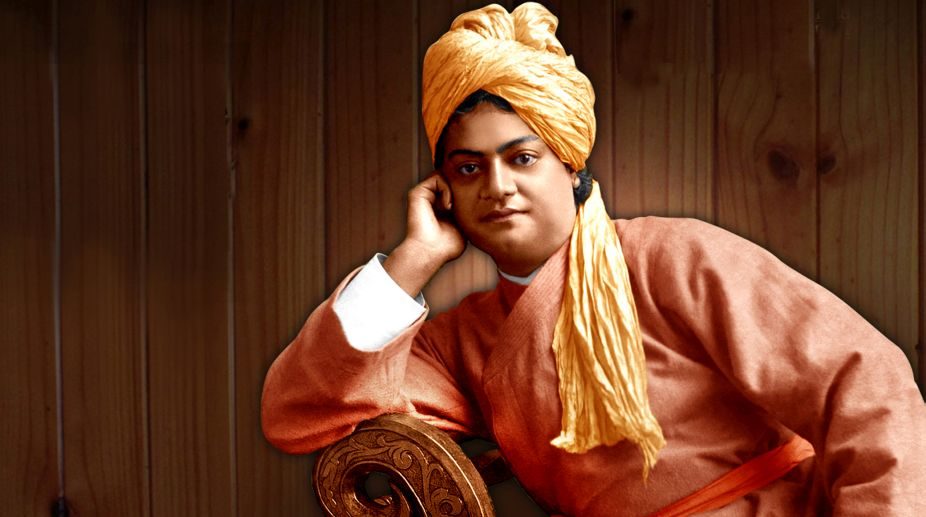Great souls are born on earth to live life for others. They are the boons to mankind. They are game changers and lead society to a more meaningful life; to discard old thoughts and habits and inculcate new ideas. Swami Vivekananda was such a great soul.
Born in late nineteenth century British-colonised India, his motherland desperately needed him. He was the voice, the source of energy, and inspiration of the future freedom struggle. He was a monk with a lion’s heart who started to awaken the sleeping, subjugated nation with the clarion call of Vedanta.
Advertisement
Vivekananda observed that religion was not the crying need of India and recalled his Master Sri Ramakrishna’s saying: “Religion is not for an empty stomach.” British colonial rule made the Indian natives’ stomach empty. This was the truth unveiled before Swamiji when he travelled throughout India mostly on foot from 1888 to 1892. He saw with his own eyes the misery and sufferings of his fellow countrymen. This misery, suffering of people of India took possession of his mind. His heart became filled with compassion. “His strong faith in himself was the instrument to re-establish in discouraged souls the confidence and faith they have lost” (Romain Rolland).
British colonial rule started showing its fiercest teeth and nails since the mid eighteenth century. Indian peasants were devastated – half of the produce from their land was snatched away by the British administration by way of tax or rent. Tribal people in hill areas were denied their forest rights, their lands were grabbed. The deft textile handicrafts of the country were ruined by the British only to sustain the British textile industry.
On the other hand, the British created and indulged the emergence of powerful landlords – the ‘Zamindars’ who were instrumental in implementing the strong grip of British administration. History tells us famine was a very common disaster under British rule almost every year in one or other part of India. Statistics gives us a record of at least seventeen outbreaks of famine in India between 1868 and 1900 in various parts of the country.
British rule not only demolished the Indian economy but also destroyed the social fabric of the country. Cultural impact of Christianity through the Missions started pouring into the society. They thought it was essential to eliminate India’s religions and establish Christianity to rule over India. But India can never be conquered for long. Even some British scholars felt that the nature of religion in India is so philosophical, logical, eternal, and universal that it could easily grasp Christianity.
Sri Ramakrishna and Vivekananda realised the objective and significance of this British repression on the religions of the poor people of our motherland. They started re-establishing the faith of the common man on our own religion, our culture, our strong heritage. They are the true Renaissance men.
Swamiji was aware of the menace of the imposed system of British capitalism. He asserted ‘mercantile civilisation’ will not do good to humanity. He strongly condemned the oppression of poor fellow countrymen when he said in unequivocal terms: “I consider that the great national sin is the neglect of the masses…they pay for our education, they build our temples, but in return they get kicks. They are practically our slaves.”
But he had not lost his faith on mankind, on the youth of the country as we had the doctrine of Vedanta. He believed a new India would emerge from the cottages of the peasants, from the huts of the fishermen, the cobbler, and the sweeper, from the grocer’s shop.
And it is a fact that British colonial rule faced strong confrontation from the peasants, the tribals. India witnessed several uprisings against British rule since the early nineteenth century and even in the late eighteenth century. These uprisings were fought to save the dignity, culture, religion and land belonging to the communities and tribes. But in all these movements, the rebellions, the peasants or the tribals i.e. the so called lower strata of the society, lost to the brutal British forces. This was obvious. But the unequal wars that these bravehearts started culminated in the larger freedom struggle that ultimately uprooted the British.
Vivekananda observed that the soul of India is deeply embedded in religion unlike other nations where it is kept in social or political independence. And this is the reason that our nation survived many troubles, atrocities, invasions. “Hidden under the ashes of apparent death, the fire of our national life is yet smouldering and that the life of the nation is religion”’
Vedanta philosophy is the own philosophy of India. Vivekananda represented it to the West, to America, to Britain. Vedanta philosophy does not owe its origin to any particular person or prophet. It is the culmination of knowledge and thoughts discovered by ancient sages through ages and centuries. These were not created. The vast array of thoughts already existed in the universe eternally. The central idea of Vedanta is oneness. ‘We must not look down with contempt on others. All of us are going toward the same goal.’
Swamiji brought the best parts of Vedanta from the confines of the Upanishads, from the Himalayas, from the forests and caves into the everyday affairs of life. Vedanta teaches men to have faith in themselves first. But this phenomenon was unfounded at that time in India. Religion did not preach it. The spiritual tradition of India suffered a setback from grinding poverty of the masses. Economy was devastated, famines, atrocities, torture on poor Indians were very common. This shook the confidence of common people. And as a result, British colonial rule could penetrate deep. This brutal rule tried to devastate the very backbone of Indian philosophy.
Vivekananda writes: “There may be weakness, says Vedanta, but never mind, we want to grow. The remedy for weakness is not brooding over weakness, but thinking of strength. Teach men of the strength that is already within them. Never say no, never say ‘I cannot’; for you are infinite.” His thoughts, his ideas, his clarion call to the youth of India started to make a difference in society.
The ultimate sermon of Swami Vivekananda was: ‘Above all be strong, be manly’; ‘believe in yourself’. ‘Do not say we are weak; we can do anything and everything.’ He said, ‘don’t think like a slave, you shall become slave’. Nobody could lead like Vivekananda to raise the self-esteem and self-confidence of teeming millions of India. It is amazing to imagine and believe today that more than a century ago Swami Vivekananda, a Hindu monk, had the courage to openly side with the downtrodden against the prevailing social stigma. Swamiji disseminated all over India the strong idea of inner strength, the belief that tremendous energy and power is stored within every human being. This idea had widespread effect on Indian youth and it raised the struggle for freedom of the mind, freedom of self-rule, and ultimately freedom from British oppression.
(The writer is a Cost Accountant serving in the West Bengal State Electricity Distribution Co Ltd as a General Manager.)
















